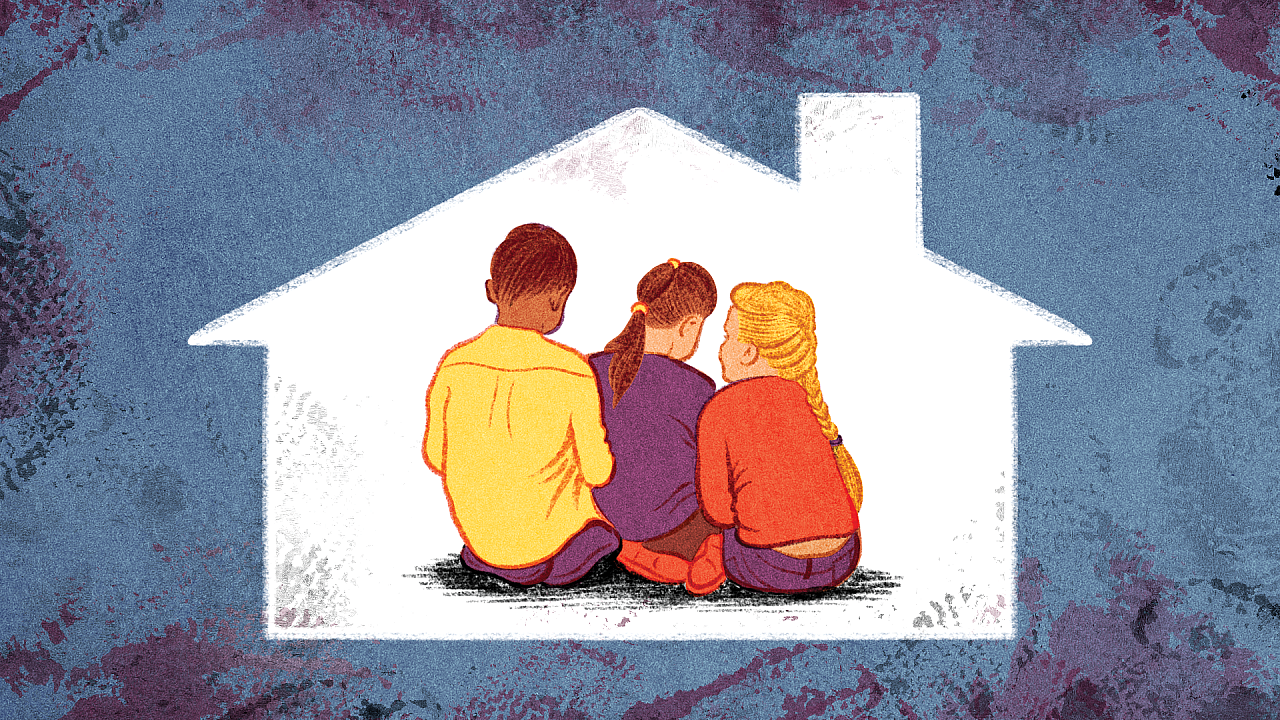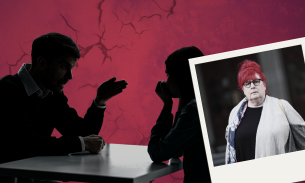
Teacher and judge who ran abusive household cannot be named, rules high court
TBIJ led legal bid to identify couple whose adopted children suffered emotional abuse, physical attacks and racism
Content warning: This story contains references to child abuse and racism.
A primary school teacher smashed their adopted children’s heads together, forced them to swallow soap and called one of them a “black bastard”.
Meanwhile, their partner, a barrister who also sat as a deputy district judge in the family courts, repeatedly failed to protect the children from the campaign of abuse.
But despite the findings, the high court has ruled that the couple cannot be identified after the Bureau of Investigative Journalism (TBIJ) led a legal bid to name them in the public interest.
Mrs Justice Theis said she had reached the “very difficult decision” after undertaking a careful balancing exercise between the rights of the media and the children’s right to privacy.
To the outside world the couple, who have been together for more than 30 years and adopted five children, projected the image of a happy family. In media appearances and interviews, the parents used this picture to promote their respective careers. In particular the teacher stood as a political candidate three times for local and national elections including for the Reform/Brexit Party.
But behind closed doors they ran a household controlled by fear, while their partner stood by and did nothing to protect the children.
The teacher would lock the children outside the house without shoes on and deny them proper meals. One child had his head flushed down the toilet and was referred to as “a disease”. Another would have his glasses confiscated so he couldn’t see properly.
Both parents – who denied the allegations but did not seek to challenge them– were also found to have routinely left the boys at home overnight without adult supervision.
Theis said the children were caused further significant harm as a result of delays to the court process, caused “in very large part” by the conduct of the parents who she said “remained focused on their own needs”.
In a judgment published today, Theis said the arguments put forward on each side relating to the issue of anonymisation at a two-day hearing in April were “compelling” but that ultimately the children’s right to privacy prevailed.
‘No right answer’
Usually it is in the interests of children who have been the subject of abuse to keep the identities of their family confidential.
In this case, however, the argument in favour of naming the parents was initially put forward by representatives of the children themselves. The reasons for this included that identifying them could help to validate the experiences of the siblings who, the local authority said, had “felt silenced” during the process.
Naming the couple could also refute any later claims made public by the parents, who had said they would “one day want to fight for justice” (although they later withdrew that position).

TBIJ was the first media organisation to apply to name the parents at a hearing in January. Arguments had already been put forward by those representing the children in favour of identification, while the local authority had adopted a neutral stance.
It was submitted there were important public interest reasons, including the nature of the jobs each parent held during the time of the abuse. Both the teacher and the judge worked in roles that brought them into direct contact with children, while the family court judge was making important decisions about their welfare.
The latter had also put their name to an email, from both parents, saying that the family court has “nothing to do” with children’s welfare.
In her judgment, Theis wrote: “[TBIJ reporter] Ms Summers sets out powerful arguments about the Article 10 rights [to freedom of expression] engaged which are supported by the other media organisations. They are also articulated with great clarity on behalf of the local authority and the [children’s] Guardian. They are complex and multi-faceted.”
It was also put to the court that anonymising the parents could damage public confidence in the family justice system, as it could be seen as one judge protecting another.
Theis, however, said the decision was not about protecting any individuals but was “about weighing up, in these very unusual circumstances, the competing [...] rights”.
She acknowledged the public interest but ultimately decided the children’s welfare needs were best met away from the glare of publicity and by retaining the parents’ anonymity.
In a carefully considered judgment – the fourth of five – Theis said it was important to recognise the “extraordinarily difficult balancing exercise” between the rights of the media and the children’s right to privacy. “There is no simple solution,” she wrote.
“There is no right answer. But whilst the public interest considerations are strong in this case they are not at any welfare cost to these particular children whose interests, bearing in mind their particular vulnerability, are important.”
Punishments ‘designed to humiliate’
At the heart of the case are three boys – aged 17, 15 and 10 – who are now back in the care system after a lengthy and harmful ordeal.
It was the two younger boys’ allegations of abuse to the police last year that set the legal saga in motion, prompting a local authority (which cannot be identified for legal reasons) to apply to bring them under its care.
The court found the children had been subjected to a controlling regime in the home including physical assaults, emotional abuse, racial slurs and punishments “designed to humiliate”.
They had their interests in court represented by a children’s guardian, while the older sibling had separate representation.
That sibling had left the family home two years earlier following allegations by the parents that he had assaulted one of them. He was arrested but no charges were brought and he was placed with foster carers.
Following a failed foster placement he was made homeless at the age of 15 before being taken in by his current foster carer in May 2023.
It was this carer who contacted the police in late January 2024 after the teenager’s younger siblings had told their brother about the abuse they were suffering. They haven’t seen their parents since, having been moved between a succession of foster placements. Now all they want is some acknowledgement from their adoptive parents about the abuse they experienced.
Talking to police, one of the boys alleged the abusive parent had attempted to strangle him and threatened to kill him. He also reported he had been made to wear shoes that were too small and been called a “black bastard”, a “black c***” and the “N word”.
The accounts of racism were corroborated by his brother, who had also been a target of the teacher’s rage. He said the parent had pulled down his trousers, smacked him on the behind and called him a “fucking bastard” after he was blamed for spilling cat food. His brother claimed their other parent – the judge – was too scared to intervene.
In a December 2024 judgment, Theis said the allegations painted a picture of an “extremely controlled” home where the teacher parented by fear. Meanwhile their partner, who as a family barrister specialised in children’s cases as well as sitting as a part-time judge, was unable to prevent the abuse.
The parents were bailed after being arrested but were told in July 2024 that a police investigation had been closed with no charges brought.
‘No blemish on our careers’
Around the same time the couple agreed to their two younger children being placed in foster care, having already accepted the older sibling was beyond parental control and that he should stay in the foster placement he remains in today.
They did not ask for any of the children to be returned to them. The teacher said they knew the youngest child wanted to return but they did not want to see him because they “would be constantly on edge and in absolute fear of further false allegations”.

The parents claimed that the eldest sibling had influenced his younger brothers into making the accusations. The judge told police that the boy was “driven by revenge” after being arrested because of their assault allegations.
The 17-year-old denied this. He said he’d enjoyed happy times with the parents, as shown in family photos and videos filed by the couple, but that they had been “increasingly tinged with fear and sadness and isolation” for him.
The local authority, having seen the transcripts of the police interviews, filed a dossier of evidence to the family court in September 2024 and a three-week trial – or “fact find” – was scheduled for December.
But the trial did not go ahead because in November, a joint statement was issued on behalf of the parents stating that, while they made “no admissions” in relation to the allegations, they no longer opposed the findings, citing the damaging effects a trial could have on them and their children. They acknowledged if they didn’t challenge the findings the court would find them to be true.
It meant instead the matter was listed to be heard over two days with a judgment to be handed down on 16 December.
In the interim a social worker filed a statement with new information received from the police. A fourth older sibling, who had previously said that the others had not been assaulted, changed his account and said that what happened to his brothers had also happened to him “but it was a long time ago”. The parents were aware of the change but did not seek to challenge his more recent account.
Then the evening before judgment was due to be handed down, the parents, who had complained of poor mental health, sent an email to the court stating they would not be attending the hearing the following day and they no longer wished to be legally represented.
This email was to become the subject of much criticism; it was a “harmful document” to the children, Theis found.
The parents wrote that they had been “restricted and silenced throughout this whole traumatic and destructive process”. They alleged the local authority and the guardian had been “intent on destroying what could have been rebuilt to prove and bolster their own poor case” and continued: “The family court has nothing to do with the welfare of the children and this outcome goes against so much of what it is supposed to stand for.”
They said: “We have been very adept individuals in our fields of work with no blemish on our careers to date and will one day want to fight for justice in relation to what has been done to us.”
Having considered the “wide canvas of evidence”, Theis went on to accept all the findings put forward by the local authority. She said it was highly unlikely that the boys’ allegations had been orchestrated by their older sibling.
‘I am going to kill this kid’
The findings included that the children were on occasion refused proper meals and offered only bread and water, while the pantry was padlocked.
The court found the teacher often became angry when the boys’ household chores were not done to their satisfaction. On one occasion, they threw books from a shelf that hadn’t been tidied sufficiently well. On another, they threw a clothes airer across the kitchen while shouting “I am going to fucking kill this kid”.
During another outburst at the same child, the parent pushed the boy’s head into a toilet and flushed it.

The bullying extended to subjecting all three children to numerous physical attacks. The youngest was hit on the back for being “too slow” to collect an iPad, and grabbed by the neck and pushed up the stairs for using the “wrong words”.
Two of the boys had their heads “smashed together” for arguing and the youngest and oldest were on separate occasions grabbed by the neck, causing one difficulty breathing and the other to briefly pass out.
In addition the family court made findings against the parents relating to their disruptive conduct during the court process.
Their actions had “cast a long shadow” over the case and harmed the children, who have shown “remarkable courage”, Theis said. The parents’ poor conduct included failing to attend a hearing, sending a vitriolic email to the local authority and making an application (which was refused) to have a TBIJ reporter excluded from court.
Theis said that the parents would present themselves as victims when it suited them but displayed a “modus operandi of securing what they want by overt or covert threatened action”.
‘The shield they used to defend themselves’
Initially the guardian for the two younger boys supported the naming of the parents but shifted her position to neutral just over a week before the hearing in April.
This came after the parents had said for the first time that they would be willing to have contact with the children – but on the condition their own identities were protected by the court (though it was later denied they had laid down this condition).
Previously they had been resolute about not seeing the children despite being aware of the boys’ wishes to do so. Their change of position after 14 months prompted the youngest child to ask the guardian if their parents were trying to blackmail them.
Theis acknowledged that this apparent change of heart may have been strategic. She said: “There is no really credible explanation by the parents, other than the proximity of this hearing date, as to why they now propose contact when they have ignored the voices of the children over so many months as they said contact would be too distressing.”
At one point the youngest child had stated he would like to return to his parents’ care if they would agree to stop smacking him. He also wanted them to “tell the truth and say they are sorry”, according to the guardian. And in November 2024 the two younger boys sent a “powerful and heartfelt” letter laying out their wishes but Theis said it “fell on deaf parental ears”.
Despite her conclusion about the parents’ motivations, Theis said the children should have the chance to see them.
Jo Delahunty KC, representing the children’s guardian, reminded the court that her client had not “flipped 180”. “She is not supporting them being anonymised,” she said.
A further factor behind her shift to a neutral position – which was supported by the third sibling – was the fluctuating wishes and feelings of the boys, who she said hold a “deep mistrust of their parents”.
Delahunty said the parents had “consistently placed their self-interests above the needs of the boys” and that in their absence, the 17-year-old had “stepped up” to support his younger siblings. The barrister told the court: “They are traumatised by their experiences and [by] how their parents have conducted their defence.”
Sam King KC for the 17-year-old highlighted how the parents had tried to use their careers to their advantage: “When the police arrived at their home the first words out of [the judge’s] mouth was: ‘I’m a barrister, I’m a judge, [they are] a teacher.’ That was the shield they used to defend themselves with.”
Those representing the parents asked Theis to consider the impact on their fragile mental health of them being named. The high court judge said that while such concerns could not be discounted, the GP letters produced had relied entirely on the parents’ self-reporting rather than independent evidence.
Theis wrote: “The reliance of the parents on their [right to privacy] needs to be considered in the context of the evidence the court has about the risks. The medical evidence about their mental health is limited, self-serving…The parents can present themselves as victims yet remain able to file their detailed position statements, their written statements, report to the court their concerns about Ms Summers and send [detailed emails].”
She said the court was left in the “unenviable position” that whatever decision it landed on would leave a lasting impact on both the children and parents, “as well as wider public interest consequences”.
The two younger children are now in their fourth foster placement since leaving their family home where the court has made an order for them to remain.
Although the parents are not currently working in their jobs it is accepted by them that the judgments should be disclosed to the relevant regulatory bodies. A regulator has already made a determination against the deputy district judge for failing to report their involvement in potential legal proceedings to their leadership judge.
Reporter: Hannah Summers
Bureau Local editor: Gareth Davies
Deputy editor: Katie Mark
Editor: Franz Wild
Fact checkers: Ero Partsakoulaki and Alex Hess
Production editor: Alex Hess
Illustration: Chanelle Nibbelink
TBIJ has a number of funders, a full list of which can be found here. None of our funders have any influence over editorial decisions or output.
-
Area:
-
Subject:







